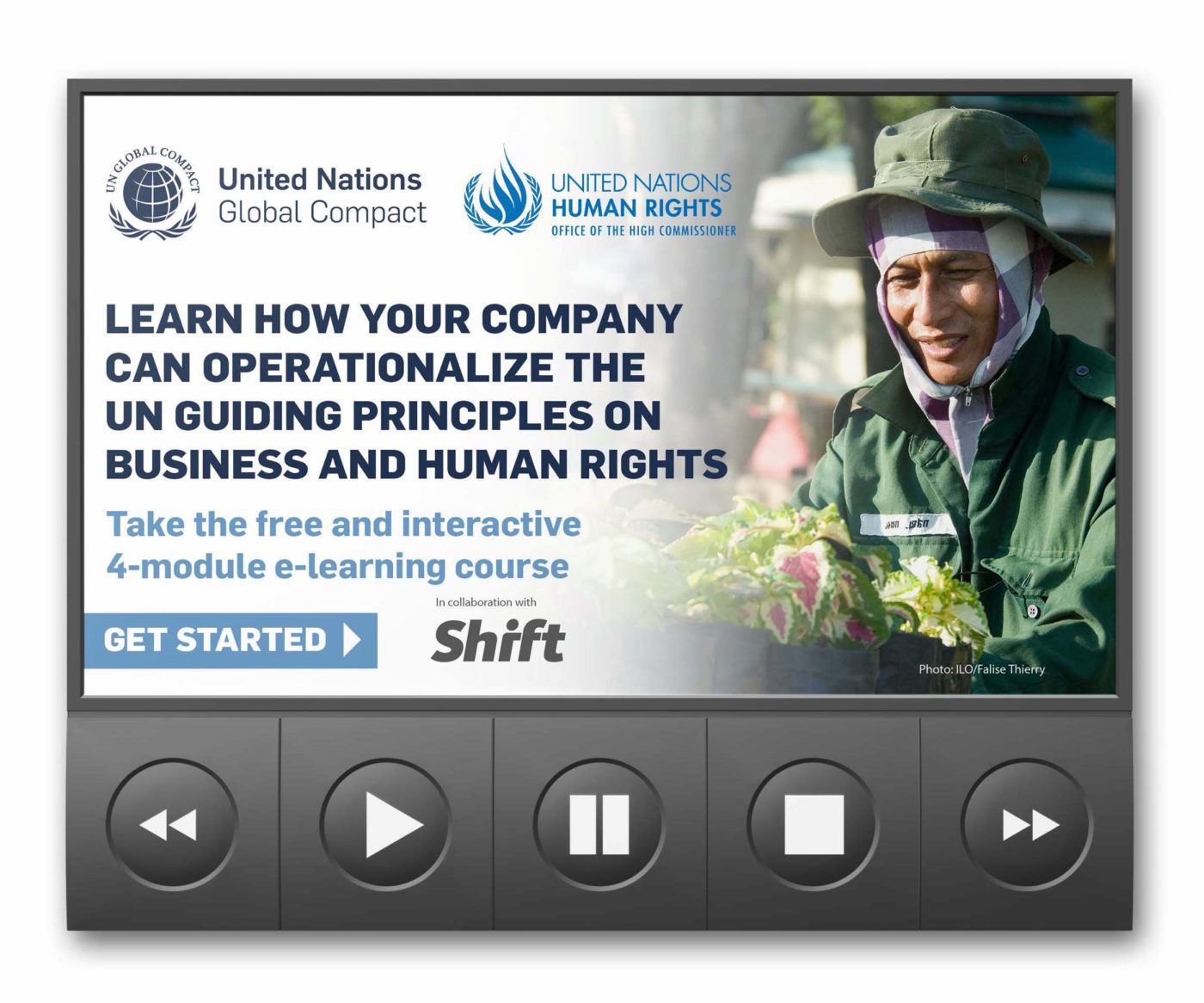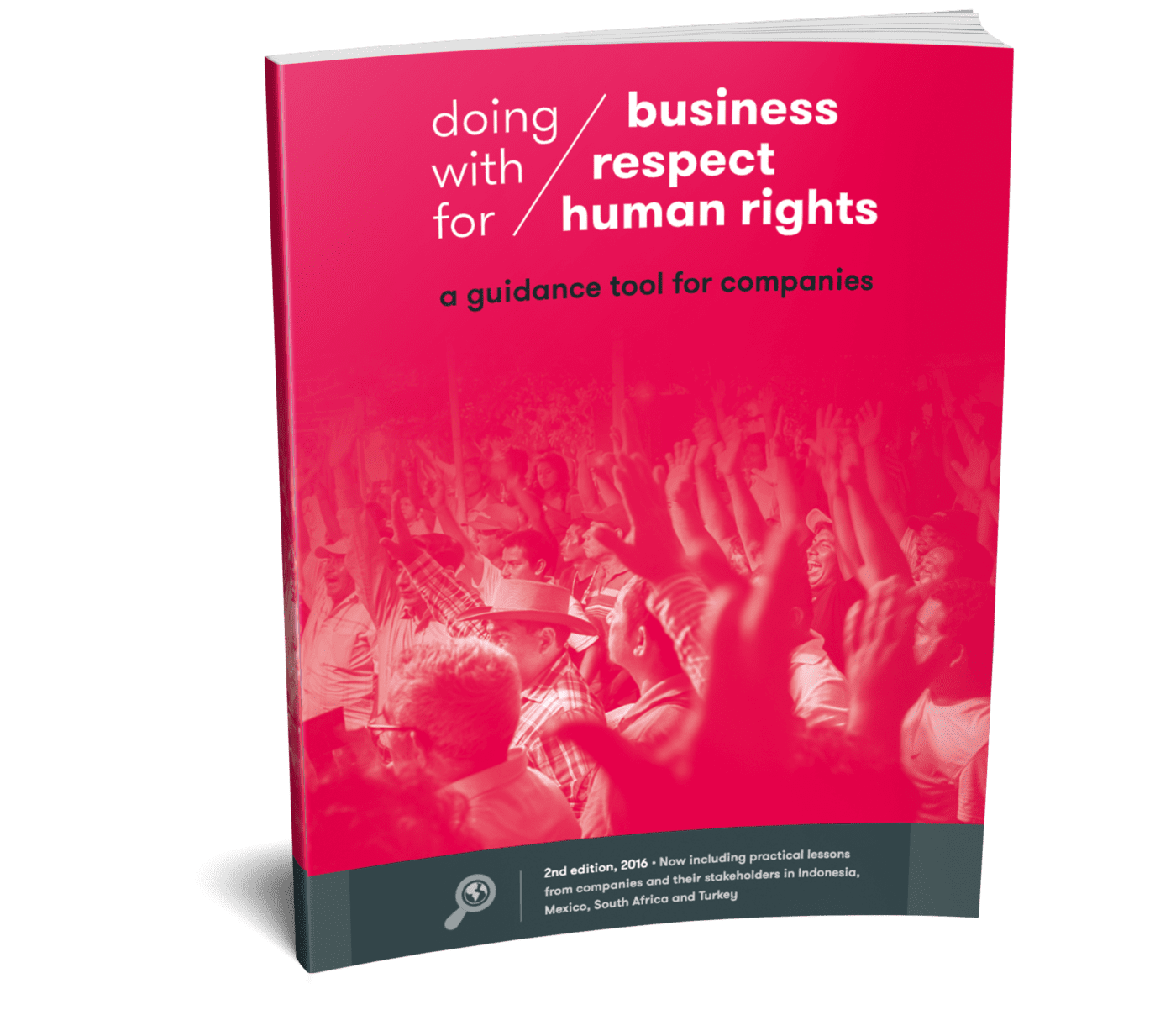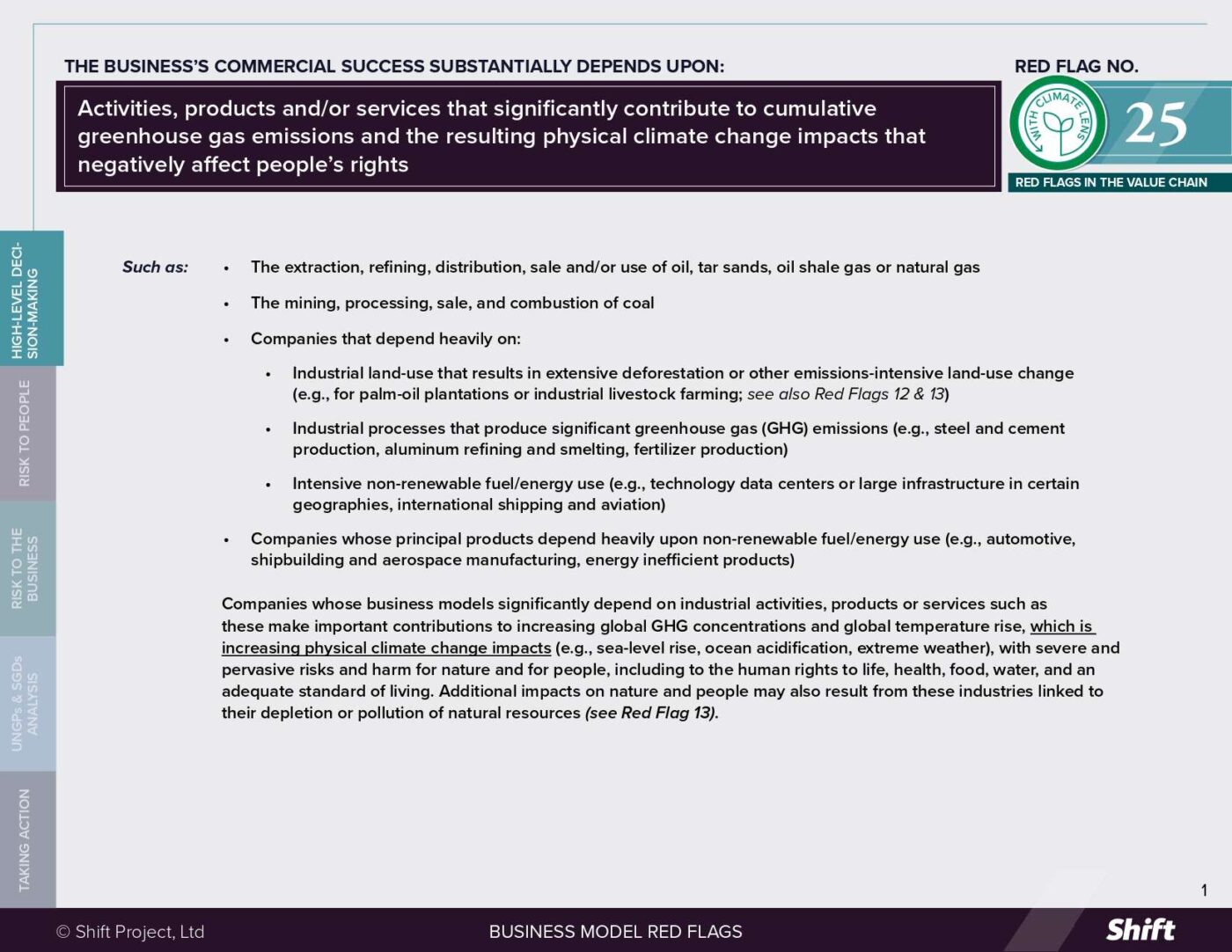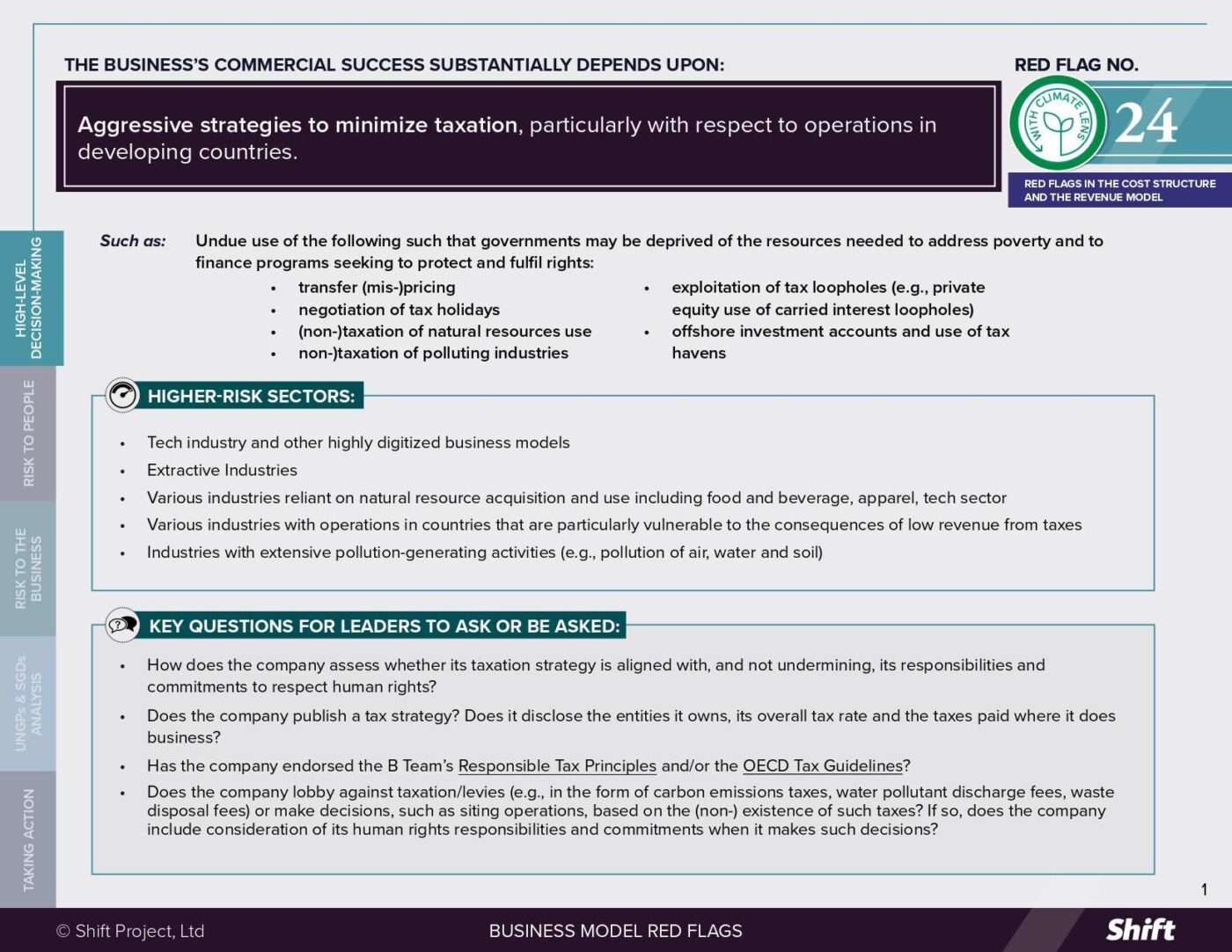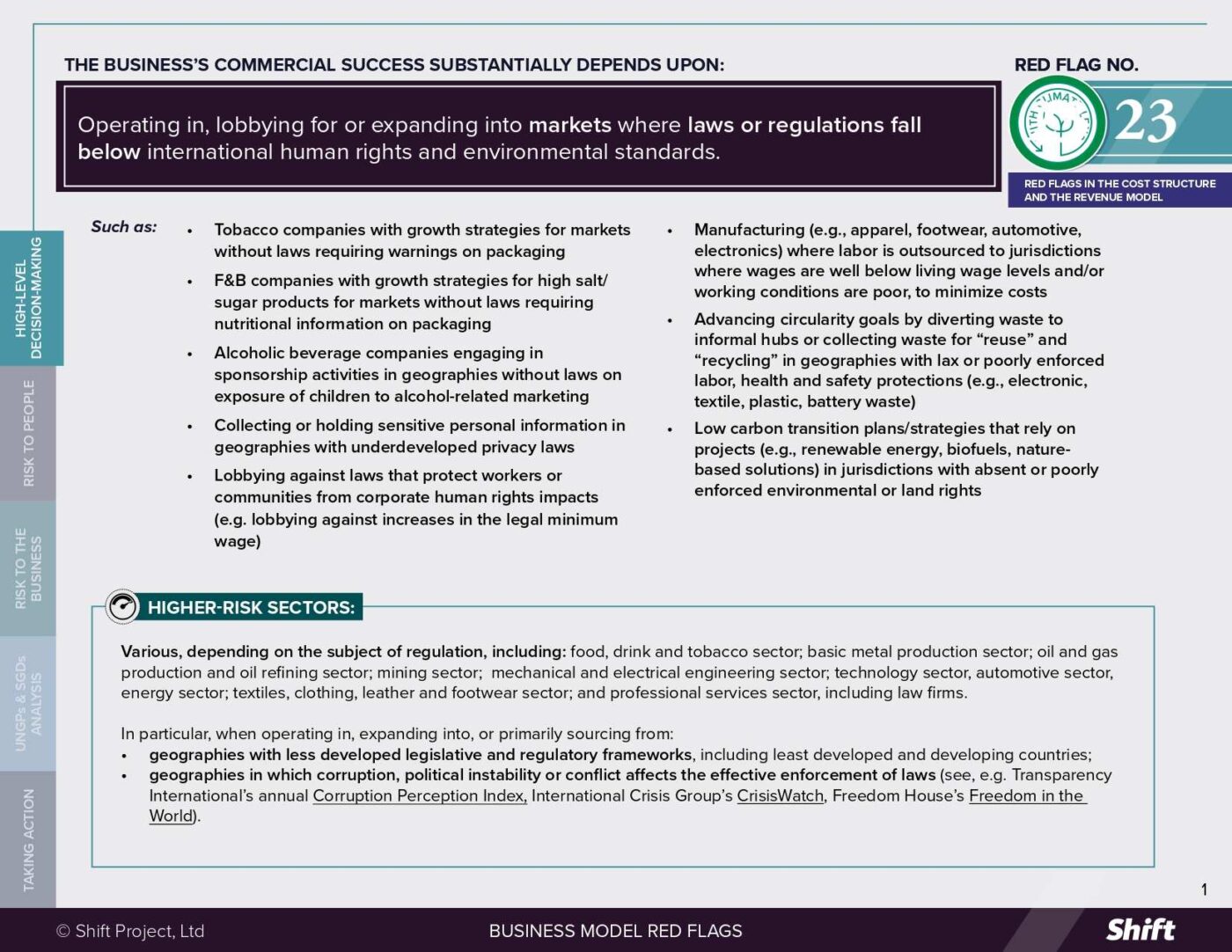Diving into the UNGPs for the first time?
If you are reading this, you’ve heard about the UN Guiding Principles on Business and Human Rights, also often referred to as “The Guiding Principles” or simply, the “UNGPs”. You’ve also probably heard that they are the global authoritative standard on business and human rights. But, what do the Guiding Principles say? What is transformative about them? And what is critical for you to know?
We’ve put together this page to help newcomers dive into the UNGPs and understand their origin, structure and purpose. It is what the headline says: a beginner’s guide. As such, it doesn’t aim to answer all questions or to dive deeply into their application (If you are looking for more nuanced content, visit our library of resources). Rather, it is meant to offer an introduction that can serve as the foundation to build upon.
WATCH THIS VIDEO
A Couple of Tools to Get You Started
A BRIEF HISTORY OF THE UN GUIDING PRINCIPLES
In 2000, UN Secretary-General Kofi Anan launched the United Nations Global Compact and the Millennium Development Goals; and five years later, he appointed Harvard professor John Ruggie as the Secretary-General’s Special Representative for Business and Human Rights. His mandate was to identify and clarify standards of responsibility and accountability for states and businesses in all regions of the world. For five years, Professor Ruggie and his team conducted extensive research all around the world, including through nearly 50 international consultations. That effort ultimately led to what became the authoritative global standard for preventing and addressing the risk of adverse human rights impacts linked to business: the UN Guiding Principles on Business and Human Rights.
The UNGPs were unanimously endorsed by the Human Rights Council in 2011. But their legitimacy also comes from the broad global consensus that was built throughout a consultative global process with governments, business, civil society and international organizations. In short, the UNGPs create a common language for speaking about the roles of states and businesses when it comes to the negative impacts on people that can result from business activities.
The UN Guiding Principles set expectations of states and companies about how to prevent and address negative impacts on human rights by business. They apply to all states and all businesses worldwide and today are being implemented by companies, governments and their stakeholders on every continent.
“The Guiding Principles are a transformational roadmap to a future where the billions of people whose lives are impacted by corporate activities are treated with respect for their dignity and fundamental welfare – a world where human beings and corporations alike can thrive and prosper.”
professor JOHN RUGGIE
The three pillars
The UNGPs are built on the three-pillar “Protect, Respect and Remedy” framework:
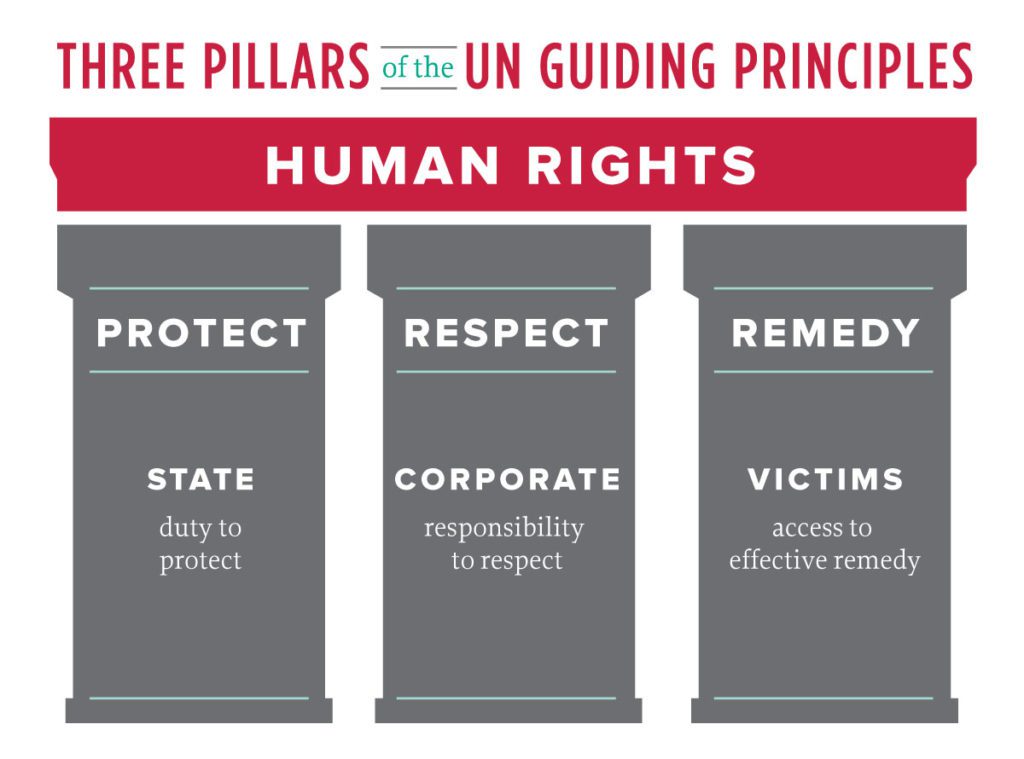
FAQs about the UNGP
WHAT ARE HUMAN RIGHTS?
The idea of human rights is as simple as it is powerful: that people have a right to be treated with dignity. Being treated with dignity is the foundation for leading a decent human life. Human rights are therefore inherent to all people as human beings, and not something that governments are free to grant or take away in the way they might do with other legal rights.
Human rights include rights to life and physical security, rights to freedom of thought, expression and religion, freedom of association and of movement, rights to education and work, to family life and privacy, to food and water, freedoms from torture, slavery or forced labor, rights to fair and decent work conditions and non-discrimination.
These and other internationally recognized human rights are set out in the Universal Declaration on Human Rights, which was adopted by the United Nations following the atrocities of the Second World War. Since then, all states have expressed support for this Declaration. These human rights are elaborated in more detail in two international conventions agreed in the United Nations (the International Covenant on Civil and Political Rights and the International Covenant on Economic, Social and Cultural Rights) and in the Declaration on Fundamental Rights and Principles at Work of the International Labour Organization.
HOW ARE HUMAN RIGHTS RELEVANT FOR COMPANIES?
Companies can have many positive impacts on human rights, including through the provision of decent jobs and a contribution to growth and development of societies. Some industries advance human rights in specific ways, such as supporting freedom of expression through information and communication technologies, supporting health by making new medicines available and accessible, or advancing development by bringing new roads and water supplies to poor communities.
Yet companies can also be involved with negative impacts on human rights.
- Companies may cause negative impacts, for example if employees are injured due to unsafe working conditions, or if companies displace communities from their lands and livelihoods without due process and compensation;
- Companies may contribute to negative impacts, for example if their purchasing practices incentivize suppliers to force workers into unpaid overtime to meet contract requirements, or if multiple companies drain or pollute the water resources essential for local communities’ drinking supply;
- Companies’ operations, products or services may be linked to negative impacts, for example if forced labor or child labor is used to harvest ingredients or make components that go into their products or if a technology company’s equipment is used by government security forces to track, imprison and harm end-users, despite the company’s reasonable efforts to avoid these outcomes.
The Guiding Principles make clear that all companies everywhere have a responsibility to respect human rights, which means to avoid having negative impacts on them and to address such impacts where they do occur. This responsibility applies to their own operations and to all their business relationships, including those throughout their value chain.
AREN’T STATES PRIMARILY RESPONSIBLE FOR HUMAN RIGHTS?
It is states that negotiate and sign up to treaties and conventions and which then have the obligation to translate them into domestic laws and enforcement processes. Their duties include respecting human rights in what they do as states, protecting human rights against abuse by others, and fulfilling human rights over time where that requires considerable resources, for example in providing access to education or clean water.
The corporate responsibility to respect human rights does not increase or decrease depending on whether states meet their own duty to protect human rights. It is, of course, much more challenging for companies to meet this responsibility when states do not have adequate standards and regulations in place, fail to enforce them effectively or even have laws that directly conflict with international human right standards. Yet while we can all recognize that challenge, the Guiding Principles nonetheless expect business to be prepared for it.
That means that all businesses should put in place appropriate policies and processes in a proactive effort to respect human rights. And those businesses that operate or have parts of their value chain in countries where governments fail to fulfill their own duties to protect human rights will need to make additional efforts to respect human rights in light of the risky environment.
HOW DO BUSINESSES PREVENT NEGATIVE IMPACTS ON HUMAN RIGHTS?
Businesses need to have the right policies and processes in place in order to try to prevent these impacts and to respond appropriately should they occur. The Guiding Principles provide a blueprint for them to do so.
That blueprint describes a three part approach that can be summarized as:
- A public commitment to respect human rights that is embedded into a business’s culture;
- An ongoing process of human rights due diligence through which the business assesses risks to human rights, integrates the findings into its decision making and actions in order to mitigate the risks, tracks the effectiveness of these measures, and communicates its efforts internally and externally;
- Processes for providing remedy to anyone who is harmed where the business caused or contributed to that harm.
Achieving respect for human rights is challenging. It is not just about companies’ own operations and employees and the activities they directly control. Nor is it just about first tier or strategic suppliers. It includes impacts that may be much more remote in their value chain and caused by third parties over which they have limited influence. But the expectation on businesses today is clear: if their products or services are linked to human rights abuses, they have a responsibility to take reasonable steps to try to change that situation.
BUT THE WORLD IS BIG AND COMPLEX AND THERE WILL PROBABLY ALWAYS BE HUMAN RIGHTS HARMS GOING ON. HOW CAN A COMPANY BE EXPECTED TO CHANGE THAT?
The Guiding Principles fundamentally changed our understanding of what we can all reasonably expect of business. They did this by recognizing that the responsibility to respect human rights is tied to impacts on people and not to how much influence a business has in a given context or relationship. They call on businesses to work to prevent and address human rights harms in connection with their own operations and value chain. If the company did not cause or contribute to the impact, and if the impact is not linked to the company’s operations, products or services through a business relationship, then the company does not have a responsibility to address it (though of course it may choose to do so for many other reasons). So the Guiding Principles put some boundaries on what companies are responsible for.
At the same time, within the scope of impacts occurring in a company’s operations and value chain, the Guiding Principles expect companies to set into motion an ongoing process of due diligence. Due diligence means making serious efforts to prevent harms, including where the company does not control a situation and may feel it lacks the ability to change things.
Due diligence also means getting better with time – including making sure the company learns from failures and blind spots, and pushing the envelope about what’s possible through innovative approaches and collaborations to increase the company’s leverage (influence) to try to prevent harms. Collaboration can be particularly critical where a business is confronted with systemic human rights abuses that it cannot fix alone. But by connecting with others and using their collective leverage, real change can happen.
For example, ten years ago, companies said they couldn’t do anything about the fact that minerals they were using from parts of central Africa were financing conflict in that region – and now, thanks to collaborative efforts, companies have shown they can actually trace the source of their materials, and they’re engaging with others to source responsibly from the region. Before the Rana Plaza disaster, many apparel companies were carrying out numerous audits on working conditions in garment manufacturing factories in Bangladesh, but systemic weaknesses in worker protections meant many workers were still suffering under unsafe working conditions. Now, the Bangladesh Accord is helping drive real change in how apparel gets manufactured in Bangladesh. These collaborative initiatives don’t lead to major changes overnight – but they can lead to real impact over time.
THE GUIDING PRINCIPLES TALK ABOUT “RESPECT” FOR HUMAN RIGHTS AND THEY SAY THAT COMPANIES CAN’T “OFFSET” HUMAN RIGHTS HARMS WITH PHILANTHROPY. WHY CAN’T POSITIVE IMPACTS ALSO “COUNT” WHEN IT COMES TO RESPECTING TO HUMAN RIGHTS?
Respecting human rights is positive and it does “count” – in a major way.
But it is about how a company makes its profits, not how it spends those profits. Donating computers to a school, building a clinic or enabling staff to volunteer in the local community can be beneficial to society. But if the same company overlooks harassment in its workplace, child labor in its supply chains, or harm to health from pollution from its operations, no beneficial acts can cancel or reduce that reality.
By contrast, when a company takes a hard look at its own (potentially significant) “footprint” on people, and takes real steps to ensure its activities are respectful of those people, it helps prevent negative impacts and can also have a truly positive, uplifting effect on people’s lives.
When a company works to drive diversity and inclusion through its workplaces, it not only reduces risks of discrimination but can open opportunities for women, minorities and others and help change attitudes in society. When a company collaborates with others to push forced labor or poverty wages out of its supply chain, it both reduces risks of abuses and helps workers around the world begin to build lives with dignity and opportunity for themselves and their families. When a company builds a new dam or digs a mine following meaningful dialogue with communities to gain their consent, rather than trusting a government’s hasty claim that the land was “uninhabited,” it protects people from dispossession and empowers them to have a say in decisions that affect them.
Respect is positive, it is transformative, it is essential. It is the hallmark of a lasting and future-ready, competitive company.

Shift and the UN Guiding Principles
Shift and the UN Guiding Principles
Did you know that Shift was founded by members of Professor Ruggie’s team? Our founders played a key role in conceptualizing and drafting the UNGPs. Now, Shift works with governments, businesses and key stakeholders to put them into practice.
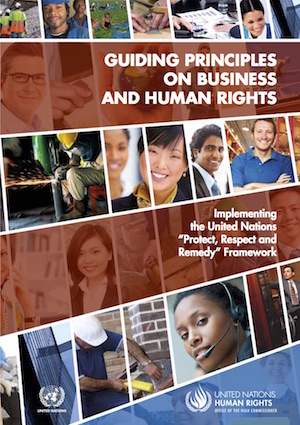
Read the UN Guiding Principles
Read the UN Guiding Principles
Ready to read the Guiding Principles?
The header photo is by Eric Bridiers, licensed under CC-ND 2.0

